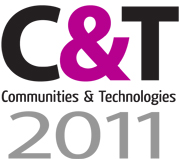From Social Butterfly to Engaged Citizen (MIT Press 2012)
From Social Butterfly to Engaged Citizen:
Urban Informatics, Social Media, Ubiquitous Computing, and Mobile Technology to Support Citizen Engagement
Edited by
Marcus Foth, Queensland University of Technology, Australia
Laura Forlano, Cornell University, USA
Christine Satchell, Queensland University of Technology, Australia
Martin Gibbs, University of Melbourne, Australia
Web 2.0 tools, including blogs, wikis, and photo sharing and social networking sites, have made possible a more participatory Internet experience. Much of this technology is available for mobile phones, where it can be integrated with such device-specific features as sensors and GPS. From Social Butterfly to Engaged Citizen examines how this increasingly open, collaborative, and personalizable technology is shaping not just our social interactions but new kinds of civic engagement with cities, communities, and spaces. It offers analyses and studies from around the world that explore how the power of social technologies can be harnessed for social engagement in urban areas.
Chapters by leading researchers in the emerging field of urban informatics outline the theoretical context of their inquiries, describing a new view of the city as a hybrid that merges digital and physical worlds; examine technology-aided engagement involving issues of food, the environment, and sustainability; explore the creative use of location-based mobile technology in cities from Melbourne, Australia, to Dhaka, Bangladesh; study technological innovations for improving civic engagement; and discuss design research approaches for understanding the development of sentient real-time cities, including interaction portals and robots.
The MIT Press
December 2011 (with 2012 copyright) • 7 x 9 • 544 pp. • 108 illus. • ISBN 978-0-262-01651-3 • US$50.00 • cloth
Foth, M., Forlano, L., Satchell, C., & Gibbs, M. (Eds.) (2012, in press). From Social Butterfly to Engaged Citizen: Urban Informatics, Social Media, Ubiquitous Computing, and Mobile Technology to Support Citizen Engagement. Cambridge, MA: MIT Press.
About the Editors
Marcus Foth, Founder and Director of the Urban Informatics Research Lab, is Associate Professor and Principal Research Fellow with the Institute for Creative Industries and Innovation at Queensland University of Technology. Laura Forlano is a Postdoctoral Associate at Cornell University. Christine Satchell is Senior Research Fellow at the Urban Informatics Research Lab. Martin Gibbs is a Lecturer in the Department of Information Systems at the University of Melbourne.
For more information visit the MIT Press website: http://mitpress.mit.edu/9780262016513 or QUT eprints >
Section 1: Theories of Engagement
Foreword
Phoebe Sengers, Cornell University, USA
1. The Ideas and Ideals in Urban Media Theory
Martijn de Waal, University of Groningen, NL
2. The Moral Economy of Social Media
Paul Dourish, University of California, Irvine, USA, & Christine Satchell, QUT, Australia
3. The Protocological Surround: Reconceptualising Radio and Architecture in the Wireless City
Gillian Fuller, & Ross Harley, University of NSW, Australia
4. Mobile Media and the Strategies of Urban Citizenship: Control, Responsibilisation, Politicisation
Kurt Iveson, University of Sydney, Australia
Section 2: Civic Engagement
Foreword
Yvonne Rogers, Open University, UK
5. Advancing Design for Sustainable Food Cultures
Jaz Hee-jeong Choi, QUT, & Eli Blevis, Indiana University, USA
6. Building Digital Participation Hives: Toward a Local Public Sphere
Fiorella de Cindio, & Cristian Peraboni, University of Milano, Italy
7. Between Experience, Affect, and Information: Experimental Urban Interfaces in the Climate Change Debate
Jonas Fritsch, & Martin Brynskov, Aarhus University, Denmark
8. More than Friends: Social and Mobile Media for Activist Organizations
Tad Hirsch, Intel People and Practices Research, USA
Bjorn Nansen, Jon Pearce, & Wally Smith, University of Melbourne, Australia
10. The Rise of the Expert Amateur: Citizen Science and Micro-Volunteerism
Eric Paulos, Sunyoung Kim, & Stacey Kuznetsov, Carnegie Mellon University, USA
Section 3: Creative Engagement
Foreword
Gary Marsden, University of Cape Town, South Africa
11. Street Haunting: Sounding the Invisible City
Sarah Barns, University of Technology, Sydney, Australia
12. Family Worlds: Technological Engagement for Families Negotiating Urban Traffic
Hilary Davis, Peter Francis, Bjorn Nansen, & Frank Vetere, University of Melbourne, Australia
13. Urban Media: New Complexities, New Possibilities — A Manifesto
Christopher Kirwan, & Sven Travis, Parsons — The New School for Design, USA
14. Bjørnetjeneste: Using the City as a Backdrop for Location-Based Interactive Narratives
Jeni Paay, & Jesper Kjeldskov, Aalborg University, Denmark
Section 4: Technologies of Engagement
Foreword
Atau Tanaka, Newcastle University, UK
16. Sensing, Projecting and Interpreting Digital Identity through Bluetooth: From Anonymous Encounters to Social Engagement
Ava Fatah gen. Schieck 1, Freya Palmer 2, Alan Penn 1, & Eamonn O’Neill 2
1 University College London, UK, 2 University of Bath, UK
Germaine Halegoua, University of Wisconsin-Madison, USA
18. Engaging Citizens and Community with the UBI-Hotspots
Timo Ojala, Hannu Kukka, Tommi Heikkinen, Tomas Lindén, Marko Jurmu, Simo Hosio, & Fabio Kruger, University of Oulu, Finland
19. Crowdsensing in the Web: Analyzing the Citizen Experience in the Urban Space
Francisco C. Pereira, Andrea Vaccari, Fabien Giardin, Carnaven Chiu, & Carlo Ratti, Senseable City Lab, MIT, USA
Laurianne Sitbon, Peter Bruza, Renato Iannella, & Sarath Indrakanti, National ICT Australia
Section 5: Design Engagement
Foreword
Mark Blythe, University of York, UK
21. A Streetscape Portal
Michael Arnold, University of Melbourne, Australia
22. Nonanthropocentrism and the Nonhuman in Design: Possibilities for Designing New Forms of Engagement with and through Technology
Carl DiSalvo, & Jonathan Lukens, Georgia Institute of Technology, USA
Laura Forlano, Cornell University, USA
24. Dramatic Character Development Personas to Tailor Apartment Designs for Different Residential Lifestyles
Marcus Foth, Christine Satchell, Mark Bilandzic, Greg Hearn, & Danielle Shelton, QUT, Australia
Epilogue
Judith Donath, MIT, USA


